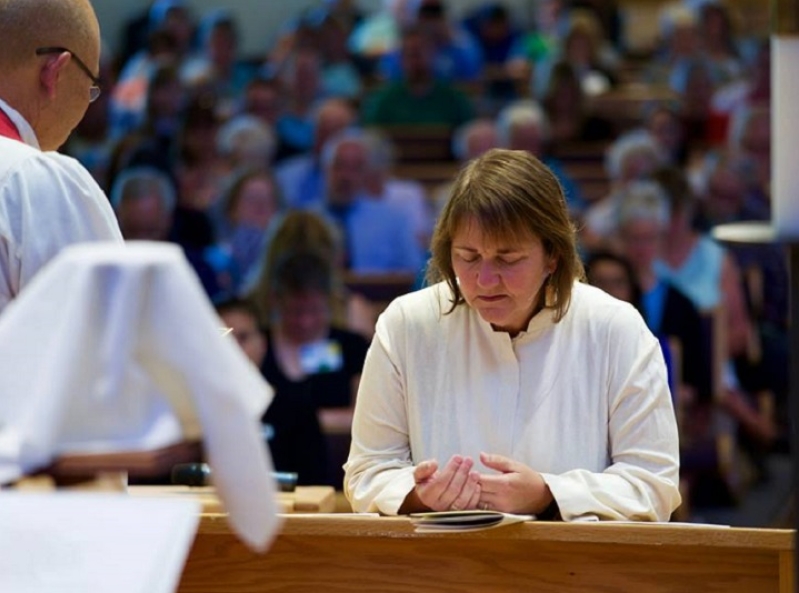
The highest court of the United Methodist Church convened on Tuesday for an oral hearing regarding the election of openly lesbian bishop Karen Oliveto last year.
The Judicial Council held the hearing in response to a motion for a declaratory decision on whether or not an LGBT person can be part of the clergy.
The motion was filed on July 2016 by Dixie Brewster, a lay delegate from the South Central Jurisdictional Conference, shortly after Oliveto was elected as bishop by the Western Jurisdiction.
In a letter requesting for a declaratory decision, Brewster asked that the question of whether or not Oliveto's election as bishop conforms with the UMC's Book of Discipline be addressed.
During Tuesday's hearing, representatives of the Western Jurisdiction and of Brewster presented their arguments before the council.
Richard A. Marsh, representing the Western Jurisdiction, said that the South Central Jurisdiction, from which Brewster belongs, cannot challenge Oliveto's election. He said a jurisdiction should be able to elect its clergy in a way that is "free from interference or oversight" from other jurisdictions.
Marsh argued that the request for a declaratory decision for Oliveto's case be dropped, saying Oliveto was "an eleder in good standing" and has "met all requirements" to be elected bishop, according to a UMC report.
However, the Rev. Keith Boyette, who represented Brewster, said the election and consecration of Oliveto as bishop violates the UMC's Book of Discipline. Boyette also mentioned Oliveto's marriage to long-time partner Robin Ridenour, a UMC deaconess, in 2014, challenging Marsh's statement that Oliveto was qualified to serve as clergy.
The Book of Discipline states that "self-avowed practicing homosexuals are not to be certified as candidates, ordained as ministers, or appointed to serve in The United Methodist Church."
Boyette added that a person who gets elected as bishop "is a bishop of the entire church" and not just of the Jurisdiction that elected him or her.
The church's Council of Bishops announced there will be a special session of General Conference on February 2019 to discuss the recommendations that will come from the Commission on a Way Forward, which was created in 2016 primarily to address the church's official stand on LGBT issues.
As the leaders of the UMC discuss such controversies, some members of the denomination are asking if the church could be heading for a split.
"To some degree, we've already split," the Rev. Kent Little of College Hill United Methodist Church in Wichita said, according to The Wichita Eagle.
College Hill advocates for the inclusion of LGBT persons in the church, including the clergy.
"I do believe we will split," Little said. "To what extent is what the commission and the final vote will determine. I think if we leave everything as is, there will probably be churches on both ends leaving."
Walter Fenton, who leads a group that advocates for traditional views of sexuality in the denomination, said the issue is not just about arguments on sexuality but, more importantly, about how the church interprets the Bible.
"It goes to a more fundamental way of how we interpret Scripture and how Christ works in our lives," he said, according to The Wichita Eagle. Fenton believes the Book of Discipline must be followed.
Some churches have already decided to leave the denomination. In early February, two big churches expressed their desire to withdraw from the UMC.
The Orchard, which has an average weekly attendance of 2,700 in its services in Mississippi, almost unanimously voted to leave UMC, with 1,025 voting in favor of the split and only 2 voting against.
Lead pastor Bryan Collier said the congregation believes they can be more effective in reaching others for Christ "if we aren't distracted by this argument," a report from the UMC said.
At the Getwell Road United Methodist Church in Memphis, 782 voted in favor of leaving the denomination, while only 19 voted against. The church's senior pastor, Bill Beavers, said they have "long expressed a desire to be able to withdraw from engaging in the distractions and move forward with ministry."
Last month, Asbury United Methodist Church, which showed "varying levels of frustration with the impasse on human sexuality and the unity of the church," also decided to leave the denomination.
However, some leaders of the denomination are hopeful that the members of the UMC will stay together.
Bishop Ruben Saenz Jr. of the Great Plains Annual Conference said the church can accomplish a lot more when working together than being apart, The Wichita Eagle reported.
"The church as a whole does so much for the lives of individuals that make it up and also for our communities," he said.






